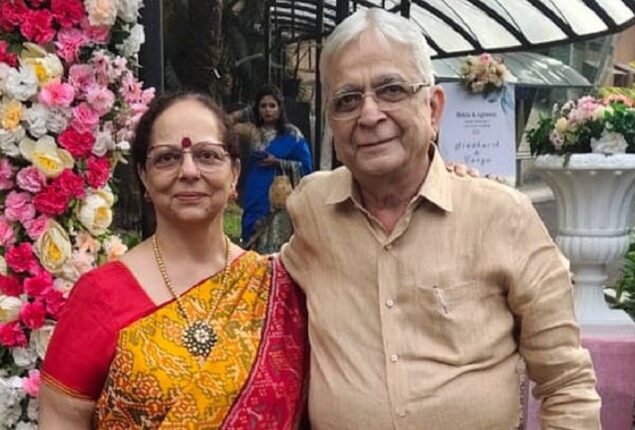Trapped woman pulled to safety from flooded car
Sue Teder's 11-week-old puppy Claire was on her lap as she dialled...

The woman declared stateless in India, UK and Uganda (credits:google)
La Popat has been in India for over five decades.
She married, had children, obtained an Indian driver’s licence, and even a voter identification card.
However, she is still unable to travel abroad as an Indian because she lacks a passport, effectively rendering her stateless.
She has now petitioned the Bombay High Court to order Indian authorities to issue her a passport.
Mrs Popat, 66, was born in Uganda in 1955 and came to India on her mother’s passport as a 10-year-old.
She has since made the country her home, with several documents proving her “Indian-ness,” as she calls it.
She is in this unusual situation because her decades-long quest for a passport has resulted in her being labelled “stateless” by three different countries.
“Every time, they’d get stuck on the issue of my citizenship,” she says.
Mrs. Popat’s father was born and raised in Porbandar, a port city in Gujarat, a western Indian state.
Mrs Popat was born in the east African country’s Kamuli town in 1955, seven years before the country’s independence from British rule.
She left Uganda with her mother and younger brother for India in 1966, during a period of intense political turmoil that resulted in the suspension of the country’s constitution and the declaration of a state of emergency.
“I arrived in India as a minor, with my name on my mother’s passport. Her passport declared her to be a British Protected Person “Mrs Popat explains. The UK government established this class of nationality.
Aditya Chitale, her lawyer, explains how she entered India without a passport at the time.
“I believe the rules at the time stated that a child could enter the country on their parent’s passport, or she would not have been allowed entry,” he says.
Mrs Popat’s family first lived in Porbandar before relocating to Mumbai in 1972. Mrs Popat married and raised her family here in 1977.
Mrs Popat applied for Indian citizenship in 1997, having met the requirements of India’s 1955 Citizenship Act, which included marriage to a citizen and seven years of residency. Her application, however, was not “viewed favourably” and was rejected.
According to the High Commission, she is ineligible to apply for a British passport because neither her father nor her paternal grandfather were “born, registered, or naturalised” in the country or its colonies after 1962.
Mrs Popat was also likely to be a Ugandan citizen, but “if the Ugandan authorities refuse passport facilities, you will appear to be a stateless person,” according to the statement.
This would be the first of many times she would hear herself referred to in this manner.
She applied for an Indian passport twice in the following decades, both times being denied by authorities.
“I would have asked if I could at least get a travel passport to visit my grandfather in the UK,” she says.
Her younger brother, who lives in Vadodara, shared their parents’ British passport.
Covid hastened India’s millionaire exodus.
“We were a blended family. We didn’t know much and relied on what the elders told us. There was no way to find out more, so we had no idea what mistakes had been made “she claims
Only after her third application was denied in 2015 did Indian authorities advise her to first register as a citizen of the country.
Mr Chitale concurs. “She should have applied for citizenship first, because she can’t get a passport without it,” he says.
Mrs Popat claims she was not properly guided.
“We didn’t know what to do, and no one told us. We would simply go in and out of various government offices, hoping to find a solution. People would simply refer to me as “stateless” and dismiss my situation as hopeless.”
In 2018, her daughter applied to the Ugandan High Commission in Delhi for citizenship or a passport, allowing Mrs Popat to apply for an Indian passport. The consulate confirmed her birth in the country but stated that she had “never been a Ugandan.”
She was asked to apply for citizenship in India “as a stateless person” once more.
Mrs Popat finally applied for Indian citizenship in 2019, but her application was denied. According to the official’s order, she had been living in the country without a valid visa or passport and thus did not meet the requirements of the 1955 Citizenship Act.
Mrs Popat claims in her 2022 petition to the Bombay High Court that this caused her depression. “But my husband is Indian, as are my children and grandchildren. I had every other government document, including an Aadhaar (a unique ID issued to all Indian residents), but none of them seemed to be sufficient “She told the BBC that
Many Indians fled Uganda in 1972, when the country’s dictator, Idi Amin, ordered that all Asians leave. However, the majority of them obtained citizenship in the United Kingdom, Canada, or India.
Mrs Popat’s case is scheduled to be heard by the Bombay High Court in August. She claims she has already missed the weddings of two of her nephews in the United Kingdom. “I’ll miss another nephew’s wedding in Dubai,” she says, “which is weeks before the court date.”
All she wants now is to be called a citizen of the country of her ancestors, where she has spent the majority of her adult life.
Catch all the International News, World News, Breaking News Event and Latest News Updates on The BOL News
Download The BOL News App to get the Daily News Update & Follow us on Google News.